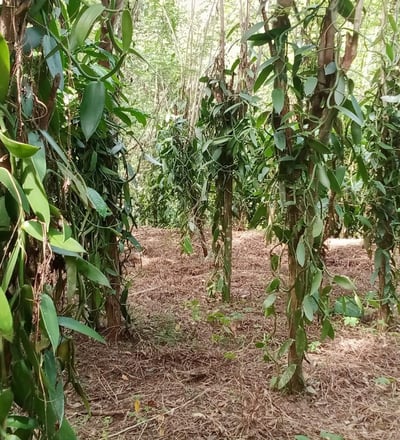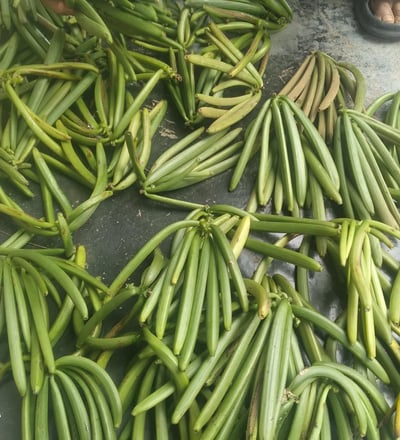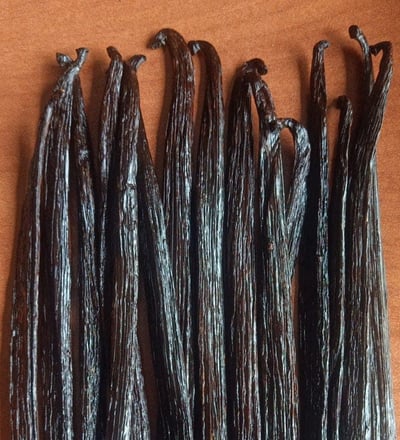Vanilla
Benefits
Vanilla is one of the most cherished and expensive spices in the world, renowned for its rich, sweet, and aromatic flavor. It is commonly used as a flavoring agent in desserts, baked goods, beverages, and perfumes. Beyond its culinary uses, vanilla has several health benefits. It contains antioxidants that help protect the body from free radical damage and may have anti-inflammatory properties. Vanilla is also known for its calming effects, which can help reduce stress and anxiety. It has been used traditionally to aid digestion, improve skin health, and even as an aphrodisiac. Vanilla's pleasant scent and flavor make it a popular ingredient in aromatherapy and skincare products.
History in Indonesia
Vanilla has a fascinating history in Indonesia, dating back to the 19th century when it was introduced to the region by the Dutch during the colonial period. Originally native to Mexico, vanilla was brought to Indonesia, where it thrived in the tropical climate. The fertile soils and ideal growing conditions in places like Java, Bali, and Papua New Guinea allowed Indonesia to become one of the world’s leading producers of vanilla. By the late 19th and early 20th centuries, Indonesia had established itself as a major player in the global vanilla market, exporting large quantities of this valuable spice to Europe and the United States. Today, Indonesia continues to be a significant producer of vanilla, known for the high quality of its beans, which are prized for their strong, sweet aroma and flavor.
Cultivation and Growth
Vanilla is a tropical orchid that requires a warm, humid climate to grow, making Indonesia an ideal location for its cultivation. The plant thrives in regions like Java, Bali, and Papua New Guinea, where the temperature ranges between 20°C to 30°C (68°F to 86°F) and there is abundant rainfall. Vanilla plants are typically grown on support structures, such as trees or poles, as they are climbing vines. The plants require well-drained, fertile soil rich in organic matter and partial shade. Vanilla cultivation is labor-intensive, as the flowers need to be hand-pollinated, usually early in the morning, to ensure that they produce beans. After pollination, the beans take about 9 months to mature.
Harvesting Season
Vanilla beans are typically harvested once they have fully matured, usually around 8 to 9 months after pollination. The harvesting season in Indonesia generally falls between June and December, depending on the region. The beans are picked when they are still green and unripe, as they continue to develop their flavor during the curing process. After harvesting, the beans undergo a meticulous curing process that includes blanching, sweating, drying, and conditioning, which can take several months. This process is essential for developing the characteristic aroma and flavor of vanilla. The cured beans are then aged for several months to enhance their quality before they are ready for sale.
Shelf Life:
Properly cured and stored vanilla beans can have a shelf life of up to 2 years or more. They should be stored in a cool, dark place in airtight containers to prevent them from drying out or developing mold. Unlike many other spices, vanilla beans can improve with age if stored properly, becoming more aromatic and flavorful over time. Vanilla extract, made from the beans, also has a long shelf life, typically lasting several years if stored in a cool, dark place.
Global Market Impact
Vanilla is one of the most in-demand and expensive spices in the world, largely due to the labor-intensive cultivation and curing process. Indonesia is one of the top producers of vanilla, alongside Madagascar and Mexico, contributing significantly to the global supply. The global market for vanilla is highly competitive and subject to price fluctuations due to factors such as climate change, natural disasters, and the complex cultivation process. The demand for natural vanilla has increased in recent years, driven by consumer preferences for natural and organic products, particularly in the food and beverage, cosmetics, and fragrance industries. Despite challenges such as high production costs and market volatility, vanilla remains a highly valuable commodity in the global spice trade, known for its unparalleled flavor and aroma.








